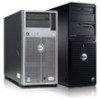Dell PowerEdge XL 5133-4 MXL 10/40GbE Switch IO Module FTOS Command Reference - Page 77
DCB Policies in a Switch Stack, DCBX Operation
 |
View all Dell PowerEdge XL 5133-4 manuals
Add to My Manuals
Save this manual to your list of manuals |
Page 77 highlights
DCB Policies in a Switch Stack A DCB input policy with PFC and ETS configuration is applied to all stacked ports in a switch stack or on a stacked switch. DCBX Operation The data center bridging exchange protocol (DCBX) is used by DCB devices to exchange configuration information with directly connected peers using the link layer discovery protocol (LLDP) protocol. DCBX can detect the misconfiguration of a peer DCB device, and optionally, configure peer DCB devices with DCB feature settings to ensure consistent operation in a data center network. DCBX is a prerequisite for using DCB features, such as priority-based flow control (PFC) and enhanced traffic selection (ETS), to exchange link-level configurations in a converged Ethernet environment. DCBX is also deployed in topologies that support lossless operation for FCoE or iSCSI traffic. In these scenarios, all network devices are DCBX-enabled (DCBX is enabled end-to-end). The following versions of DCBX are supported on an Aggregator: CIN, CEE, and IEEE2.5. DCBX requires the LLDP to be enabled on all DCB devices. DCBX Operation DCBX performs the following operations: • Discovers DCB configuration (such as PFC and ETS) in a peer device. • Detects DCB misconfiguration in a peer device; that is, when DCB features are not compatibly configured on a peer device and the local switch. Misconfiguration detection is feature-specific because some DCB features support asymmetric configuration. • Reconfigures a peer device with the DCB configuration from its configuration source if the peer device is willing to accept configuration. • Accepts the DCB configuration from a peer if a DCBX port is in "willing" mode to accept a peer's DCB settings and then internally propagates the received DCB configuration to its peer ports. Data Center Bridging (DCB) | 63















